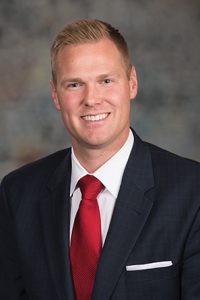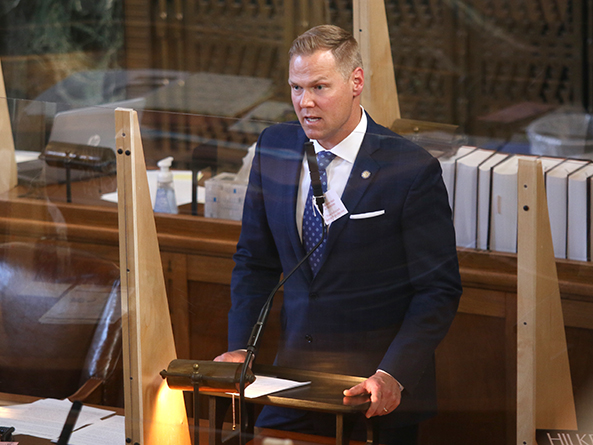Phaseout of Social Security income tax advanced
The Nebraska tax on Social Security income would be phased out gradually under a bill given first-round approval April 26.

As introduced by Omaha Sen. Brett Lindstrom, LB64 would set the exemption on such income, to the extent that it is included in federal adjusted gross income, at 20 percent in tax year 2021. The exemption would increase by 20 percent per year until reaching 100 percent in tax year 2025.
Nebraska is one of only 13 states to tax Social Security income, Lindstrom said, but he acknowledged the need to take a slow approach to ending the tax entirely — citing concerns over decreased revenue to the state.
As introduced, the state Department of Revenue estimated that the bill would decrease general fund revenue by nearly $32 million in fiscal year 2021-22 and $138 million by FY2026-27.
A Revenue Committee amendment, adopted 45-0, would extend the phase-out period to 10 years, starting the exemption at 5 percent of AGI for tax year 2022, increasing to 20 percent in 2023 and rising 10 percent per year until reaching 100 percent in 2030.
Lindstrom said the change would impact Nebraskans across the income spectrum. The proposal could incentivize individuals with disposable income to stay in Nebraska who might otherwise move to a state that does not tax Social Security income, he said, and could help low-income retirees stay in their homes.
“[Taxing benefits] hurts our vulnerable seniors, especially those on a fixed income, and it seems logical to move away from the taxation of Social Security entirely,” Lindstrom said.
Elkhorn Sen. Lou Ann Linehan supported the proposal. Nebraska consistently has ranked at the bottom of desirable retirement options, she said, because of the state tax on Social Security income.
“We need to do better,” Linehan said. “We need to be more competitive if we want retirees to stay in Nebraska and continue to contribute to our state financially through other taxes — especially property taxes — and through social, family and cultural contributions.”
Sen. Mark Kolterman of Seward also supported LB64, saying it would increase financial security for senior citizens on fixed incomes. He said the average monthly Social Security benefit in Nebraska is $1,232.
“This isn’t a tax break for the rich,” Kolterman said. “This allows our citizens receiving Social Security benefits to live with greater dignity and better independence.”
Henderson Sen. Curt Friesen said other considerations, such as property tax rates and proximity to grandchildren, are as important to people as taxation of their Social Security benefits when it comes to deciding where to live.
He expressed concern with the proposal’s “substantial” fiscal impact and suggested that senators consider the revenue position that their decisions will create for future lawmakers. He said a more targeted approach might be a better option that could lower the bill’s projected impact on the state’s revenue stream.
“We’re going to have to start making some choices and some of them are going to be hard choices,” Friesen said. “But we’re going to have to look at what our priorities are and how we fund those priorities … we’re going to have to start deciding how much money can we give away?”
Sen. Michael Flood of Norfolk offered and later withdrew an amendment under which the Social Security income exemption would be indexed to adjusted gross income. The exemption would start at 20 percent for those married filing jointly with an AGI of less than $75,000 in tax year 2022 and gradually increase until topping out at 4 percent for filers with higher incomes.
For individuals, the exemption would start at 20 percent for those with an AGI of less than $60,000 in tax year 2022. The proposal would cap eligibility for married couples filing jointly at an AGI of $95,000 and for individuals at $80,000.
Flood said the amendment — which mirrors the provisions of LB237, introduced by Gordon Sen. Tom Brewer — would have a much less significant revenue impact but still would benefit seniors who need it most. Department projections show the proposal would reduce general fund revenue by $884,000 in FY2021-22 and $34 million in FY2026-27, he said.
Brewer supported the amendment as a compromise in the face of potentially negative economic news. The state’s Economic Forecasting Advisory Board is scheduled to meet April 29 to provide lawmakers with an updated revenue forecast.
“With the limitations that we may have, this is a way of giving relief to those who need it and not to blow up the cost,” he said.
Following adoption of a technical amendment, lawmakers voted 47-0 to advance LB64 to select file.


